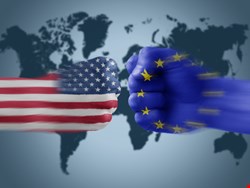
“Americans are not better at everything; I can give you a long list of things we are not better at”, Clarke added. “But at this stuff – intelligence gathering – we are much, much better than everyone else when we are on the offense, but not neccesarily on the defense.”
Clarke, currently the CEO of Good Harbor consulting, sat on a panel today at the RSA Conference in San Francisco, where he was joined by former CIA and NSA director Gen. Michael Hayden (ret.), and James Lewis, former State Department veteran and currently director of the Center for Strategic and International Studies (CSIS).
The panel unanimously agreed that the 9/11 terrorist attacks have had a profound effect on the current surveillance apparatus in the US, but some of the programs, namely FISA, predate the 2001 incident.
“Snowden is effect, not cause in this case”, asserted Hayden when speaking about public reaction to the NSA leaks.
“There is nothing unlawful going on here, there are may things that are unwise but not unlawful when viewed in the light of the social contract we brought out of the 1970s”, Clarke observed. The intelligence programs have been authorized by multiple presidents and reviewed and overseen by the judicial branch, with oversight by the Congress.
“This is Madisonian government at its finest, with all three branches having an input”, Hayden added in agreement.
Lewis then said he was surprised by people’s reaction to the Snowden revelations. “I assumed people knew this, and that was a mistake. My conversations with people in other governments confirmed they knew we were doing this”, but many among the general public, worldwide, did not.
“Other nations knew we were doing this.” Their outrage, Clarke asserted, is full of hypocrisy, as he specifically singled out reactions by those in the French and German governments. “The French criticized us for collecting intelligence on foreign leaders. But every time Obama picks up his BlackBerry the French are trying to access it”, he said.
“It’s true that in Washington, if you are on a phone call, there are seven or eight other people on the line. You just have to get used to it”, Lewis said in agreement. “The European intelligence agencies knew what we were up to, so there was no surprise.” The European public’s reaction, however, is entirely different he maintained, as they largely had no idea about the extent of the surveillance being conducted by the NSA.
“I never found a country that did not do internal surveillance”, Lewis remarked, and then asked the panel what can be done to assuage the trust concerns of foreign governments and their citizens.
“Foreign governments should have the same oversight we do: courts, parliamentary, review boards, and the like. The problem here is not oversight”, Clarke responded. “This is”, he said of the US efforts, “the most transparent intelligence community on the planet.”
“European parliamentarians know more about American espionage efforts than they do about their own – and it’s not even close”, Hayden chimed in. He then hinted that outraged politicians in Europe should take a look at what’s going on in their own countries before pointing a finger at the US intelligence programs.
“I don’t think the American people have a problem with their government doing things in secret, as long as they have a general idea that its going on”, Clarke insisted. “But you need to be able to explain to the people what is going on.” Somewhere along the line there, he added, there was a disconnect between what information the government needed to collect and what it was actually collecting.
“Just because we can collect certain information, that doesn’t mean we should or need to”, he insisted. “We were collecting a lot of shit we didn’t need to, and that we shouldn’t be collecting.”
The problem, as Clarke outlined, was that policy makers did not specify the type of information they wanted collected. “The policy community – and not just the Obama administration, but the last several administrations – did not take the time to learn about the intelligence community, and have proper oversight of it.” Clarke also reminded the audience that while the NSA does not engage in political surveillance, much like the FBI did throughout the 1950s and 1960s, the technology to do so is readily available.
“Once you have a police surveillance state, you can’t turn it off because the surveillance state will prevent anyone from organizing against it”, Clarke observed. “We don’t have a police surveillance state now, but the technology is there to do it. We need more roadblocks to prevent this now, before that surveillance state gets turned on. We have oversight on our surveillance apparatus now, but not much in the way of transparency.”
“In the future”, Clarke then warned, “once you give up your civil liberties, you may never get them back.”
Lewis then added that he worries about the “chilling effect of an intrusive oversight process” and what impact it might have on the American government’s ability to collect intelligence.
“When our citizenry feels unsafe, we get criticized for not doing enough”, said Hayden, former NSA/CIA chief. “As soon as we make our citizenry feel safe again, we get criticized for doing too much. If we curb our ability to collect intelligence”, he maintained, “then our government will be largely unaware of what’s going on” among the terrorist actors. “When you have lawful tools, be careful about taking them off the table”, Hayden cautioned, adding that it’s dangerous to live inside the box if you are looking to maintain national security.